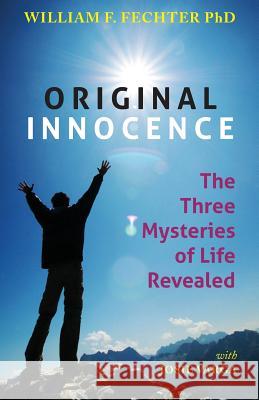Original Innocence: The Three Mysteries of Life Revealed » książka
Original Innocence: The Three Mysteries of Life Revealed
ISBN-13: 9781490475479 / Angielski / Miękka / 2013 / 194 str.
Original Innocence is William Fechter's insightful and seminal work offering a new paradigm of innocence instead of the traditional religious beliefs centered around a fallen human status. This serious, explanatory work will reveal the three mysteries of life concerning suffering, ignorance, and creation. The paradigm from human guilt and culpability to a soul's original and eternal innocence is indeed a paradigm shift of great magnitude. The dominant theme of the book encourages the reader to understand that most suffering is caused by ignorance. In turn, this ignorance can be traced back in origin to mankind's original innocence-meaning our soul's inexperience. Original Innocence makes a radical break from other books of the genre in that it explains the origin of ignorance, and the necessity for a soul's unawareness for souls to even exist. It is an evolving process of serial experiences that create unique souls as expressions of the Infinite Absolute that most call "God." Dr. Fechter uses a scientific approach in his research to discover the root cause of the "ignorance" that the Buddha realized was the origin of human suffering. The author also answers the age-old questions about God being infinite and perfect, and if so, then why is there so much human suffering here on Earth? He states that, "Infinite Perfection and Intelligence only creates imperfection if it has the necessity to do so," and "If ignorance does indeed cause so much suffering in the world, then why not find the origin of that ignorance?" Original Innocence inspires with its unique paranormal treatise. It details how both religion and scientific materialism have been "off the mark" with their explanations about human imperfections. The author also addresses the creative process in regard to the soul's meaning and purpose in the universe, as expressions of the infinite Source of all that is or ever will be. The book is aimed at astute minds that wish to tackle some of life's most salient questions about God, love, innocence, ignorance, and suffering. Fechter had a realization about the relationship and necessity of variation in the relative phenomenal world. Later that realization led to his discovery of the origin of ignorance and its divine implications for the creation of unique souls as expressions of the "Infinite Absolute." The genesis of Fechter's spiritual experiences came when he visited the spiritual realm and experienced telepathic communication while receiving a "life review" from a spiritual entity that gave him love, acceptance, and compassion. This spiritual tome is not religious per se, but will appeal to a wide audience of searchers across the spectrum of belief, disbelief, and curiosity. The author sees individual souls as "expressions of God" rather than "children of God." This is because the term "children of God" makes God seem like a parent seen in a father-like human image rather than humans made in the image of God, which is in fact spiritual in nature.
Zawartość książki może nie spełniać oczekiwań – reklamacje nie obejmują treści, która mogła nie być redakcyjnie ani merytorycznie opracowana.











